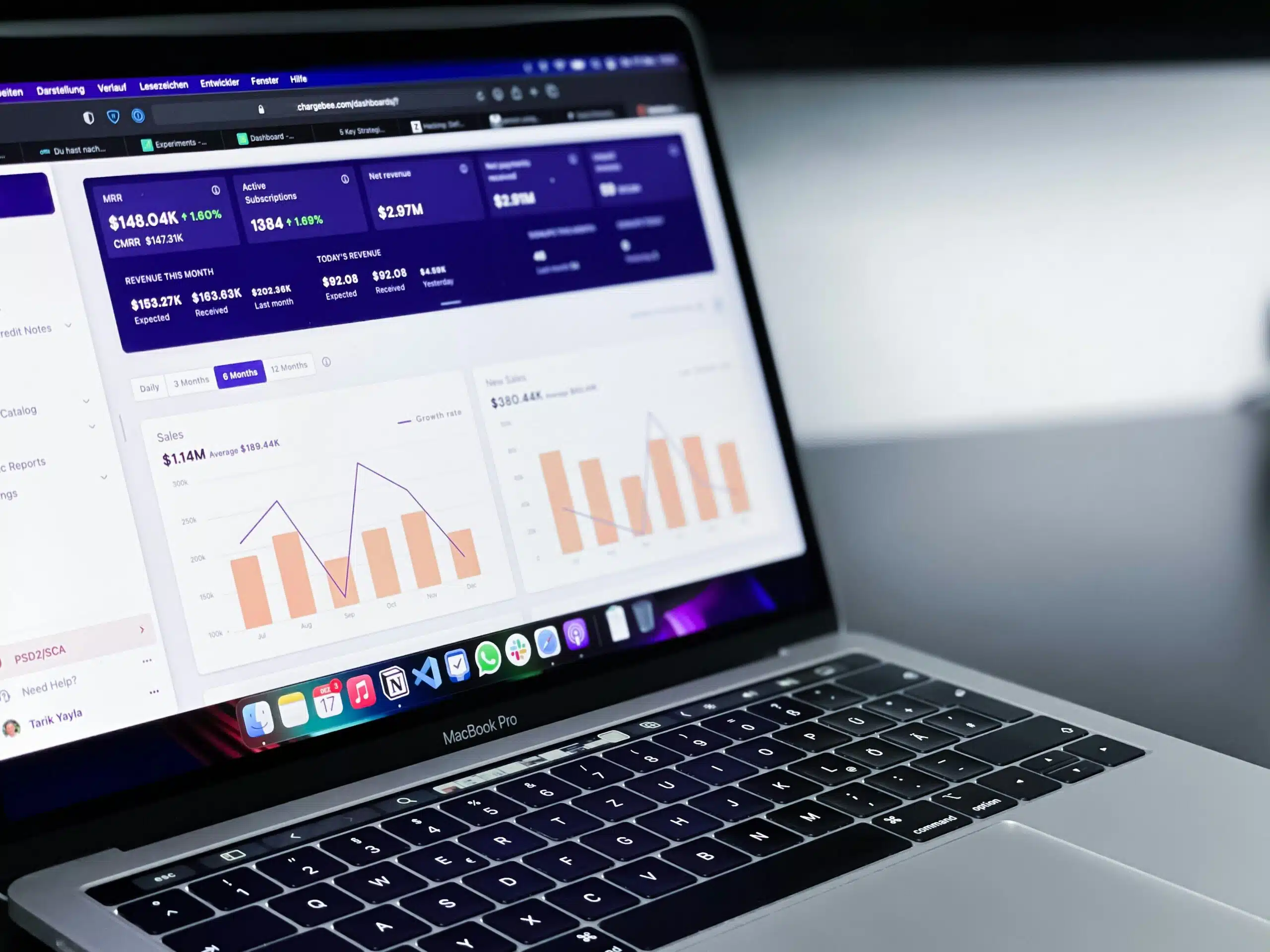The marketing landscape is experiencing a profound transformation propelled by Artificial Intelligence (AI). This shift encompasses various facets, from deciphering big data intricacies to streamlining workflows for optimal operational efficiency.
Beyond enhancing user experiences, marketers are harnessing AI’s predictive analytics to craft strategies that exhibit remarkable accuracy.
As AI evolves from novelty to necessity, it heralds a future characterized by personalized, efficient, and intelligent marketing.
Join us on a journey through this dynamic landscape where AI-driven marketing is not merely a trend but an emerging standard.
Key Takeaways
- AI Is Transforming Marketing Through Predictive Analytics and Personalized Content Creation
- Real-Time Sentiment Analysis and Influencer Marketing Strategies Are Becoming AI-enhanced for Greater Effectiveness
- Marketing Professionals Must Adapt to AI Advancements by Upgrading Infrastructure and Cultivating a Skilled Workforce
- AI-driven a/B Testing Strategies and Analytics Help Refine Marketing Campaigns for Optimal Engagement and Conversion Rates
- Adopting AI in Marketing Introduces Efficiency by Automating Repetitive Tasks, Freeing Professionals to Focus on Strategic and Creative Work
Demystifying AI’s Role in Modern Marketing Strategies

In an era underscored by the rapid evolution of technology, Artificial Intelligence (AI) has emerged as a cornerstone of modern marketing innovation.
This transformative force extends far beyond the realm of code-laden computations, to become an indispensable ally for marketing professionals.
Brands are increasingly turning to AI to navigate the complexities of contemporary marketing strategies successfully.
From unlocking the potential of big data for nuanced customer segmentation to enhancing user experiences through predictive analytics, AI is revolutionizing how marketing teams approach their campaigns.
However, to fully harness the power of this technology, marketers need to grasp the fundamentals of AI.
With a solid foundation in AI’s capabilities, they can identify and implement key applications that propel data-driven decision-making to new heights.
Breaking Down AI’s Definition for Marketers
To marketers venturing into the dynamic marketing landscape, Artificial Intelligence, or AI, can be succinctly defined as the simulation of human intelligence in machines orchestrated to think and act like humans.
Specifically, for those in charge of brand narratives and consumer engagement, this means leveraging machine learning, natural language processing, and complex algorithms to glean insights and predict behaviors, reinventing the wheel of traditional marketing approaches.
- Embracing machine learning for refined data analytics and segmentation
- Applying natural language processing to sharpen brand messaging strategy
- Employing sophisticated algorithms for breakthroughs in customer experience
Identifying Key AI Applications in Current Marketing
In today’s marketing landscape, AI plays a pervasive yet subtle role, seamlessly integrated to enhance efficacy. Its impact on understanding consumer behavior and crafting targeted strategies is undeniable. AI-driven tools have fundamentally changed how agencies leverage and interpret data, enabling more accurate predictions of future consumer trends. This paradigm shift empowers brands to pioneer innovative approaches in engaging with their clientele.
| AI Application | Marketing Impact |
|---|---|
| Machine Learning | Deeper insights into customer preferences and behavior |
| Natural Language Generation | Automated, personalized content creation at scale |
| Deep Learning | Enhanced computer vision for interactive product experiences |
| Sentiment Analysis | Real-time reputation management and brand sentiment tracking |
| Predictive Analytics | Forecasting market trends and customer demand |
Understanding the Data-Driven Approach of AI
Artificial Intelligence infuses marketing with a data-driven approach, elevating the precision with which organizations analyze customer data and tailor their marketing efforts. By sifting through the vast expanses of consumer data, AI strategies provide actionable insights that can significantly streamline the decision-making process for marketing teams.
The efficacy of AI in predicting market movements and customer behavior is rooted in its ability to transform large volumes of complex data into a clear strategic direction: AI algorithms interpret the intricacies of big data to unearth underlying patterns, offering a competitive advantage in crafting targeted advertising and marketing efforts.
| AI-Driven Approach | Impact on Marketing |
|---|---|
| Data Analysis Precision | Sharper, more effective client segmentation and personalization |
| Real-Time Adaptability | Dynamic campaign adjustments in response to consumer sentiment |
| Automated Efficiency | Streamlined workflows with heightened operational efficiency |
| Predictive Modelling | Proactive market research and trend anticipation |
| Customer Journey Analysis | Enhanced understanding of the customer experience for retention and loyalty |
The Impact of AI on Consumer Data Analysis

The infusion of Artificial Intelligence into marketing practices has set the stage for an unprecedented level of understanding consumer preferences, behaviors, and experiences.
Marketing torchbearers, by deploying AI, now can transform vast and seemingly indomitable datasets into actionable insights that drive strategic marketing initiatives.
With the precision of predictive analytics, organizations can tailor their marketing efforts to address consumer needs proactively, resulting in not just improved customer engagement, but also a shift towards anticipatory marketing paradigms.
These technological strides are fundamentally altering how enterprises track, interpret, and respond to customer behavior, paving the way for more personalized and timely marketing solutions.
How AI Revolutionizes Customer Behavior Tracking
AI has redefined how brands track customer behavior, moving beyond observation to understanding and anticipating actions. Analyzing data from various interactions, AI constructs a multi-dimensional view of consumer habits, shifting marketing from reactive to proactive approaches. This evolution in tracking creates a complex map of touchpoints in the customer journey.
AI systems analyze these touchpoints, identifying patterns and preferences that empower marketers to craft deeply personalized experiences, fostering brand loyalty and affinity.
Transforming Raw Data Into Actionable Insights With AI
At the forefront of digital marketing transformation, Artificial Intelligence serves as an alchemist, turning raw data into actionable insights. Its strength lies in distilling the essence of big data, enabling the creation of campaigns that resonate individually with the target audience.
AI-savvy marketing agencies bring brand strategies to life by uncovering hidden patterns and trends within customer data. The sophistication of AI in unraveling these complexities leads to precise marketing solutions, fostering more meaningful and impactful connections with clientele.
Tailoring Marketing Efforts Through Predictive Analytics
Predictive analytics stands as a pillar within the AI-driven marketing sphere, giving brands the foresight to tailor their marketing efforts with an astonishing degree of precision. By leveraging historical data and current market signals, this AI functionality forecasts consumer behavior, guiding marketing strategies toward future success.
With the advent of predictive analytics, marketing has become a forward-looking pursuit, anticipating individual customer needs and thereby refining the accuracy of targeted advertising. This strategic anticipation ensures that each marketing effort is not just a shot in the dark but a well-informed move toward increasing engagement and conversion rates.
| AI Functionality | Marketing Benefit |
|---|---|
| Behavioral Forecasting | Preemptive strategy alignment with projected consumer actions |
| Targeted Advertising Precision | Enhanced relevance of promotional content to individual users |
AI-enhanced Personalization and Customer Engagement

Artificial Intelligence is driving a paradigm shift, merging the pursuit of deep customer connections and personalized service with cutting-edge technology. Marketing strategies are breaking free from generalized approaches, with companies leveraging AI to craft unparalleled customer experiences and strengthen brand loyalty.
Real-time personalization plays a pivotal role, spearheading the creation of hyper-tailored content and transforming the landscape of customer engagement through the lens of AI algorithms. This results in profound enhancements in both the reach and resonance of marketing efforts.
Crafting Individualized Customer Experiences With AI
Artificial Intelligence is reshaping the fabric of customer interaction by personalizing experiences at an individual level. By dissecting granular data, AI excels in identifying unique consumer needs, enabling brands to deliver content and offers that resonate personally with each customer.
Marketers are now empowered with AI tools that not only grasp customer preferences but also anticipate future desires, crafting experiences that evolve in tandem with the customer’s journey. This approach ensures that customer engagement is not merely timely, but deeply connected to individual behavioral patterns and expectations.
Strengthening Customer Relationships Through AI Algorithms
AI algorithms are skillfully strengthening the connections between brands and consumers, actively fostering enduring relationships through insightful engagement. In real-time, these algorithms analyze interactions, adjusting communications and offers to match evolving customer needs, deepening affinity toward the brand.
Employing AI to dissect and understand each customer’s behavior enables companies to orchestrate relationship-building strategies that are relevant and responsive. This utilization of AI not only nurtures loyalty but also transforms customers into vocal brand ambassadors, expanding its reach and reinforcing its market presence.
Real-Time Personalization Tactics Powered by AI
By skillfully applying AI in real-time personalization strategies, marketers can close the gap between consumer expectations and experiences. AI dynamically tailors product recommendations and messaging to the current context, making each interaction highly relevant and significantly more likely to drive engagement.
In this era of digital transformation, AI acts as an intuitive guide, adapting communications instantaneously based on real-time behavior and transactional data. This agility ensures that every marketing touchpoint is an opportunity to deliver a bespoke user experience, solidifying the client-brand connection and fostering a sense of unique value.
Optimizing Campaign Performance With AI Tools

In the quest for excellence within marketing spheres, professionals are seeking innovative methods to amplify the efficacy of their campaigns.
The integration of Artificial Intelligence (AI) into marketing tools provides a powerful engine for optimizing performance.
These advanced systems enable the precise selection of tools geared towards campaign enhancement, foster the continuous evaluation of campaign metrics through AI analytics, and advocate the refinement of marketing messages with AI-driven A/B testing strategies.
Embracing these AI-driven methodologies arms marketers with the capability to not only track but also dynamically improve marketing strategies, ensuring they resonate optimally with their intended audiences.
Selecting the Right AI Tools for Campaign Optimization
The advent of Artificial Intelligence (AI) technology in the marketing realm has brought forth an array of advanced tools designed to optimize campaign performance. As marketing professionals evaluate the diverse landscape of AI solutions, the focus rests on identifying tools that align with their specific strategic goals, seamlessly integrate into existing workflows, and enhance overall marketing effectiveness.
Choosing the most fitting AI tools necessitates a comprehensive assessment of their functionalities, scalability, and compatibility with the data analytics infrastructure already in place. Such scrutiny ensures that marketing teams leverage tools capable of providing insightful data analysis, automating tasks for operational efficiency, and elevating the responsiveness of their campaigns:
- Insightful data analysis tools for understanding target audience behavior
- Automation platforms for streamlining repetitive marketing tasks
- Responsive systems that adapt campaigns in real time based on actionable analytics
Measuring and Adjusting Campaigns With AI Analytics
Marketing professionals are increasingly recognizing the pivotal role of AI analytics in campaign measurement and adjustment. Artificial Intelligence streamlines the task of tracking campaign performance, offering detailed insights that inform strategic adjustments.
By integrating AI analytics, marketing teams are equipped to respond swiftly to market signals and consumer feedback, refining campaign elements to enhance engagement and achieve higher conversion rates:
| Performance Metric | AI Analytics Impact |
|---|---|
| Consumer Engagement Levels | AI provides real-time data allowing for prompt adjustments in engagement strategies. |
| Conversion Rate Effectiveness | Insightful analysis pinpoints aspects of the campaign requiring optimization to improve conversions. |
| ROI of Marketing Efforts | AI analytics assess campaign ROI, guiding budget allocation for maximum impact. |
Adapting campaigns in real-time is essential for maintaining relevance and driving marketing success; AI analytics is the linchpin in this dynamic environment, empowering campaigns to not just hit their marks but to continuously evolve them based on the rich insights offered.
AI-driven a/B Testing to Refine Marketing Strategies
AI-driven A/B testing emerges as a sophisticated tactic in refining marketing strategies, where machine learning algorithms assess the performance of variant marketing elements against each other. By employing this methodology, marketers gain the advantage of making data-backed decisions, driven by insights that pinpoint the most effective components of their campaigns.
With the precision of AI technology, A/B testing elevates from a simple comparison to a complex strategy optimization tool. This approach enables marketing and sales teams to deploy nuanced campaigns, seamlessly adjusted and fine-tuned in real-time for maximal impact and resonance with target demographics.
Streamlining Marketing Workflows With Automation

As the digital transformation forges ahead, marketing professionals are increasingly incorporating Artificial Intelligence into their strategic arsenal, revolutionizing not only campaign methodologies but also the essential workflows that undergird them.
AI’s introduction to the industry signifies a turning point, offering marketers the ability to eradicate repetitive tasks, enhance team collaboration, and significantly improve operational efficiency.
By bridging the gap between human creativity and machine precision, AI technologies are setting the stage for more streamlined, optimized marketing processes that promise to reshape the efficiency and outcomes of marketing departments worldwide.
AI in Eliminating Repetitive Tasks in Marketing Workflows
Embracing Artificial Intelligence in the marketing ecosystem equates to granting skilled professionals the freedom to focus on strategy, creativity, and innovation. AI serves as the linchpin for automating mundane and repetitive marketing tasks, such as data entry, schedule management, and basic customer support, shifting the momentum towards activities that necessitate human intellect and imagination.
The strategic implementation of machine learning and automation tools within the marketing workflow ushers in a new era of productivity. Marketers now leverage AI to refine email marketing campaigns, personalize newsletters, and manage social media posts, ensuring consistent and timely content delivery without manual intervention:
| Marketing Activity | AI Automation Impact |
|---|---|
| Email Campaign Management | Automation of scheduling, sending, and A/B testing of emails |
| Newsletter Personalization | Dynamic content customization based on consumer data analytics |
| Social Media Posting | Scheduled postings and audience engagement analytics |
Enhancing Collaborative Efforts Using AI Platforms
Advances in Artificial Intelligence have facilitated collaborative processes within marketing teams by providing AI platforms designed for enhanced communication and project management. These sophisticated systems foster a more integrated approach to campaign development, allowing for real-time updates and collective ideation, driving cohesiveness even in geographically dispersed teams.
With the integration of AI-driven platforms, organizations are witnessing a remarkable elevation in the synergy among their marketing professionals. AI acts as a catalyst for idea exchange and critical discussions, streamlining the path from conceptualization to campaign execution without sacrificing individual contribution or team dynamics.
Achieving Operational Efficiency Through AI Integration
The integration of Artificial Intelligence across marketing operations is the key to unlocking enhanced operational efficiency. AI technology paves the way for refined process automation, reducing time spent on manual tasks and allowing talent to concentrate on strategic initiatives that drive brand growth and consumer connections.
Inherently adaptable and scalable, the sophisticated AI systems offer a transformative approach to marketing resource management. The precise analytics and automation capabilities of AI ensure marketing professionals can react to evolving market conditions with agility, optimizing resource allocation for campaigns while minimizing wastage and redundancy.
Anticipating the Evolution of AI in Marketing

As we stand on the cusp of further advancements in artificial intelligence, it becomes imperative for marketing professionals to process not just present applications, but also the trajectory of AI’s growth within their domain.
A carefully honed anticipation for upcoming AI trends provides a lens through which marketers can preemptively adapt their strategies.
Moreover, businesses at the forefront of this wave are those who prioritize a culture steeped in innovation, equipping themselves to harness AI’s full potential.
With these pivotal themes in mind, marketers propel themselves and their organizations toward a future replete with opportunities defined by the intelligent leverage of AI technologies.
Upcoming AI Trends That Marketers Should Watch
As we peer into the future of marketing, Artificial Intelligence is poised to present a slew of emergent trends that will sculpt the marketing realm. Among these, the rise of voice search and its integration into marketing planning stands paramount, requiring a new focus on conversational keyword strategies and local search optimization.
Another significant trend on the horizon is the use of AI for real-time sentiment analysis during marketing campaigns:
- Enhanced real-time sentiment analysis will allow brands to make pivotal campaign adjustments at a moment’s notice, aligning more closely with consumer moods.
- Advanced influencer marketing strategies powered by AI will help brands identify and collaborate with influencers in a more data-driven and result-oriented manner.
- Refined predictive analytics will provide more precise forecasts for customer purchasing patterns, optimizing inventory management and targeted marketing efforts.
Marketers will need to keep a watchful eye on the evolution of privacy laws related to customer data, ensuring compliance and maintaining trust in this rapidly changing landscape.
Preparing a Business for the Next Wave of AI Advancements
As businesses contemplate the next wave of AI advancements, there’s a palpable thrust toward reimagining their infrastructure to support the seamless integration of AI technologies. Preparing for AI entails a systematic upgrade of hardware, alignment of software, and nurturing an organizational mindset open to the flux of digital innovation.
To stride confidently into the realm of advanced AI marketing, firms must foster a workforce skilled in navigating the intersection of technology and marketing analytics. Building a team of versatile professionals, adept in AI tools and strategies, becomes crucial to creating marketing solutions that not only engage consumers but also drive business success.
| Aspect of Preparation | Objective | Outcome |
|---|---|---|
| Infrastructure Upgrade | Enable integration of cutting-edge AI technologies | Robust foundation for deploying advanced AI capabilities |
| Cultivating Skills | Equip teams with expertise in AI-driven marketing practices | Enhanced proficiency in leveraging AI for impactful marketing strategies |
Fostering a Culture of Innovation to Leverage AI in Marketing
To stay at the forefront of the digital economy, organizations must cultivate an innovative culture that embraces the transformative impact of AI on marketing. This cultivation hinges on empowering their workforce with the freedom to explore and experiment with advanced AI tools, fostering an environment where creative solutions are not only encouraged but expected to drive marketing success.
As AI continues to alter the marketing and advertising landscape, companies that imbue their operations with a spirit of innovation will be best positioned to leverage these technologies. Nurturing a culture that values continuous learning, adaptive strategy development, and the integration of AI insights into marketing campaigns, is essential for sustaining competitive advantage in an AI-augmented market.
Conclusion
In conclusion, as Artificial Intelligence continues to redefine the canvas of marketing, understanding its fundamentals becomes crucial for professionals seeking to navigate this transformation successfully.
AI’s impact on marketing is profound, offering unprecedented opportunities for personalized engagement, operational efficiency, and data-driven decision-making.
By leveraging AI tools for sophisticated data analysis, predictive analytics, and real-time personalization, marketers can craft highly targeted, effective campaigns that resonate deeply with consumers.
Additionally, AI is pivotal for automating repetitive tasks, enhancing collaborative efforts, and providing insights that optimize campaign performance.
As the marketing landscape evolves with emergent AI trends, businesses must prepare by upgrading their infrastructure, cultivating a skilled workforce, and fostering a culture of innovation.
Embracing AI’s transformative potential will arm marketers with the foresight and capabilities necessary to remain competitive and lead in a digital economy shaped by AI advances.





